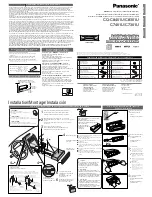
34
7.
Initial setting of adjustment value
8.
Recording of Iop information
9.
Temperature compensation
offset adjustment
10. Laser power adjustment
11. Iop NV Save
12. Traverse adjustment
13. Focus bias adjustment
16. Auto gain adjustment
6-4. AUTO CHECK
2. PRECAUTIONS FOR CHECKING LASER DIODE
EMISSION
To check the emission of the laser diode during adjustments, never
view directly from the top as this may lose your eye-sight.
3. PRECAUTIONS FOR USE OF OPTICAL PICK-
UP (KMS-262A)
As the laser diode in the optical pick-up is easily damaged by static
electricity, solder the laser tap of the flexible board when using it.
Before disconnecting the connector, desolder first. Before con-
necting the connector, be careful not to remove the solder. Also
take adequate measures to prevent damage by static electricity.
Handle the flexible board with care as it breaks easily.
Optical pick-up flexible board
4. PRECAUTIONS FOR ADJUSTMENTS
1. When replacing the following parts, perform the adjustments
and checks with
in the order shown in the following table.
2. Set the test mode when performing adjustments.
After completing the adjustments, exit the test mode.
Perform the adjustments and checks in “group Service” of the
test mode.
3. Perform the adjustments to be needed in the order shown.
4. Use the following tools and measuring devices.
• Check Disc (MD) TDYS-1 (Parts No. 4-963-646-01)
• Test Disk (MDW-74/GA-1) (Parts No. 4-229-747-01)
• Laser power meter LPM-8001 (Parts No. J-2501-046-A)
or
MD Laser power meter 8010S (Parts No. J-2501-145-A)*
1
• Oscilloscope (Measure after performing CAL of prove.)
• Digital voltmeter
• Thermometer
• Jig for checking BD (MD) board waveform
(Parts No. : J-2501-196-A)
Optical
Pick-up
IC101
IC102
IC151
IC190
IC195
D101
pick-up
flexible board
laser tap
5. When observing several signals on the oscilloscope, etc.,
make sure that VC and ground do not connect inside the oscil-
loscope.
(VC and ground will become short-circuited.)
6. Using the above jig enables the waveform to be checked with-
out the need to solder.
(Refer to Servicing Note on page 7.)
7. As the disc used will affect the adjustment results, make sure
that no dusts nor fingerprints are attached to it.
*
1
Laser power meter
When performing laser power checks and adjustment (electrical
adjustment), use of the new MD laser power meter 8010S (Part
No. J-2501-145-A) instead of the conventional laser power me-
ter is convenient.
It sharply reduces the time and trouble to set the laser power
meter sensor onto the objective lens of optical pick-up.
Parts to be replaced
Adjustment
















































